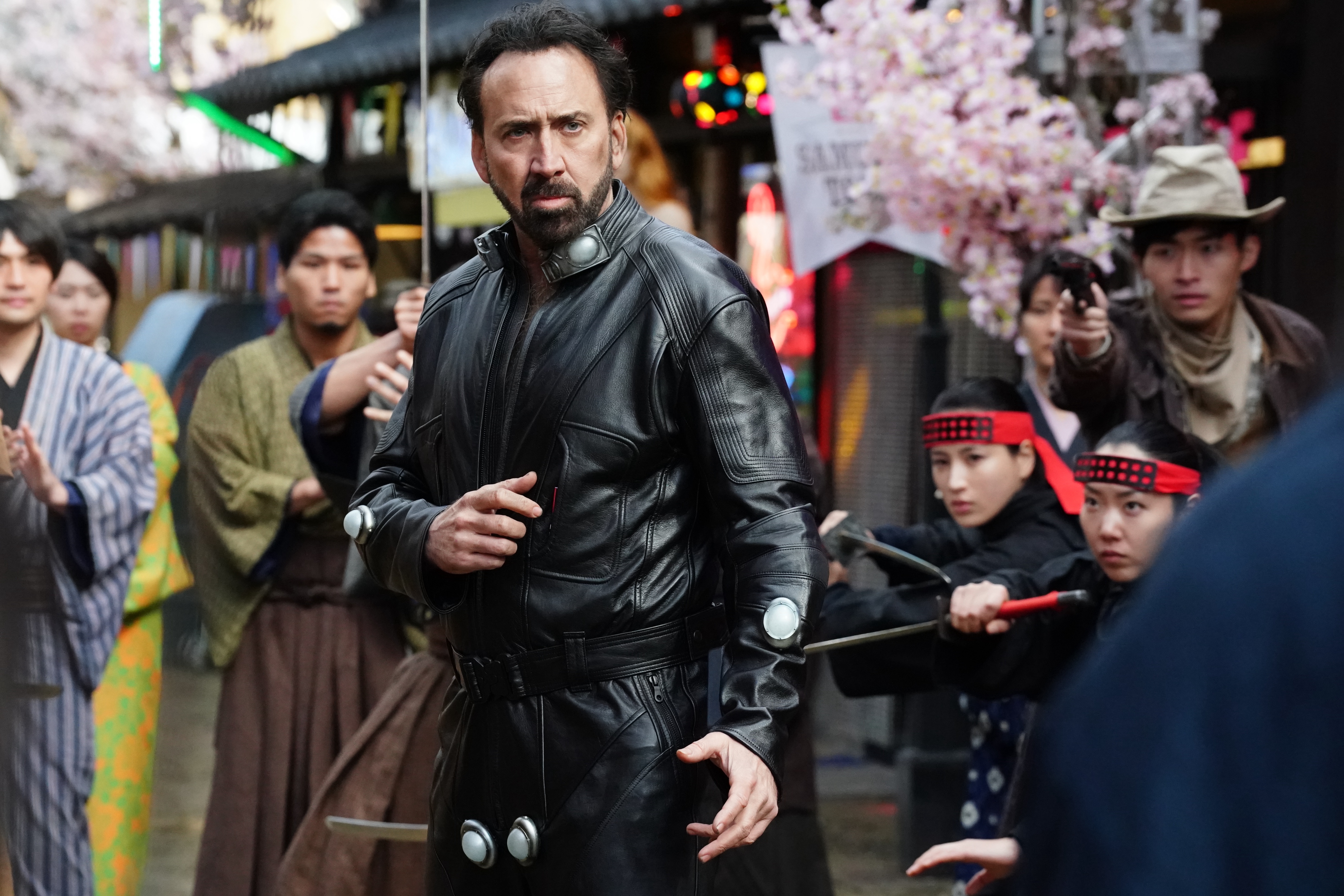Nicolas Cage isn't nuts enough in the fitfully demented Prisoners Of the Ghostland
Too rarely does Sion Sono's first movie in English achieve any gonzo fun

Early in Prisoners Of The Ghostland, Nicolas Cage, playing a protagonist known only as Hero (presumably because Neal Stephenson had already used Hiro Protagonist), is assigned an impossible mission, tricked into donning a black leather jumpsuit studded with explosives, and handed the keys to what looks like a turbocharged Toyota Celica GT-Four. Hero gets into the car, revs the engine, performs a badass-looking donut for the assembled throng… and then stops, exits the vehicle, and proceeds to commandeer what’s clearly a child’s bicycle, furiously pedaling off to intrigue and danger. Classic gonzo Cage, but the absurdity doesn’t last long; someone follows Hero in the car and forces him to stop, at which point he sighs, acknowledges that the clock is ticking (on the explosives in his jumpsuit, if nothing else), and drives away in the Celica like an ordinary action star. In hindsight, it’s a moment that feels frustratingly emblematic.
Why Hero needed any vehicle is something of a mystery. The first movie predominately in English from Japanese director Sion Sono (Tokyo Tribe, Why Don’t You Play In Hell?), Prisoners Of The Ghostland aims to be a samurai western set in a post-apocalyptic dystopia—part Sukiyaki Western Django, part Mad Max Beyond Thunderdome. The film essentially has only two sets, however, and it’s been shot and edited in a way that inadvertently suggests they’re separated by about 75 yards. We first encounter Samurai Town, a standard Main Street drag in Japanese dress, where everyone’s Asian excepting the four main characters. Jailed for a bank robbery he committed with sidekick Psycho (Nick Cassavetes), Hero gets summoned by the Governor (Bill Moseley), who offers him a deal: rescue the Governor’s ostensible granddaughter, Bernice (Sofia Boutella), who’s been abducted by vague supernatural beings in a region called the Ghostland, and he can go free. If he tries to harm Bernice, explosives in his arms will go off; if he gets sexually excited by her, his testicles are in danger. And if he fails to deliver Bernice safely within five days, a charge around his neck will impose the death penalty.
At its best, this is the kind of movie in which at least one of the testicle charges does in fact get triggered, provoking a deranged Cage bellow and (later on) one of the actor’s patented cranked-to-11 line readings. On the whole, however, he looks fitfully committed here, coasting on generic intensity; Hero boasts all the specificity of his name, which demands an archetypal approach (à la Eastwood’s Man With No Name), and that’s just not really in Cage’s wheelhouse. Boutella, likewise, has nothing to play, and resorts to screaming and snarling. What keeps Ghostland from flatlining is Sono’s gift for delirious spectacle, along with the movie’s tacit acknowledgment that it’s utterly ridiculous. We never get a clear sense of the evil that controls this self-enclosed world (or even why people can’t just leave), but we do get victims outfitted in arresting jigsaw-mannequin face masks, and a bank designed to resemble the interior of a gumball machine (even before an actual, ludicrously huge gumball machine in the lobby sends candy colors flying), and exposition that’s delivered first in un-subtitled Japanese, then repeated/translated by a dancing Greek chorus. There’s not quite enough of such inspired lunacy to plug the film’s gaping narrative holes or compensate for its thinly drawn characters, but at least there’s always something to stave off boredom.
Given the many pistols and samurai swords on view, it’s a bit surprising that there’s so little over-the-top action. One extended slice-and-dice set piece, accompanied by Jim Croce’s “Time In A Bottle” (a song that had already been turned into one of the all-time great needle drops, but whatever), delighted viewers when Prisoners Of The Ghostland premiered at Sundance nine months ago; our own A.A. Dowd called the sequence “solid” and “Tarantino-grade” (which one might argue is a contradiction in terms, but, again, whatever). Mysteriously, however, that scene doesn’t appear in the cut of Ghostland that’s currently being provided to critics, and it presumably isn’t in the cut that audiences will be able to see. Music rights usually get secured promptly nowadays—those issues generally involve either older films and TV episodes transferred to a new platform/medium or ultra-low-budget productions that can’t afford the song in question—so it’s unclear why this apparent crowdpleaser got pulled. Shame, though, as a sporadically entertaining, maddeningly incoherent movie like Prisoners Of The Ghostland can use every diversion it’s got.